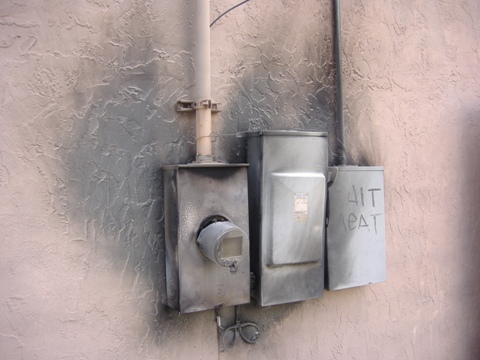
How about this… You get called to a structure fire. The outside team is going around back to control utilities, and the meter itself is on fire. The electrical disconnect is at the meter and it to is also involved in the fire. What do you do? – Jimm-

call power company to shut power off at pole. until then suppress the fire with a chemical fire bottle. Easy as that
Dry-Chem to keep it under control and wait until the power company gets there. Stay safe!
The fuse link should drop at the pole almost immediatly and power will be shut off. If for some reason it does not then a CO2 extinguisher would be the proper tool.
If you can’t hold it with a co2 and the power co., like in our local, has a 1 hr. response min. wait time, I don’t like to, but you can always cut the taps. The power co. taught us that at the electric trainning school.
At the risk of sounding dumb, what are the “taps”? Sounds like a good thing to know, however we have not been shown this.
DC, you don’t sound dumb. Thats how we learn. TAPS are the three lines that run between the pole and the house. (service lines)If you cut them, you can either start at the bottom and cut up or the top and cut down. Only cut one wire at a time, and do not come in contact with the wire that you cut as you move up to make the next cut. If you start at the bottom, I recomend you start there, next cut the middle and last you cut the top. It is no big deal.Be careful not to cut the cable that runs from the pole to the house. That cable is what will keep the lines from falling down after your cut. Just before the wires come to the house is where you can cut them. Again, if you can wait on the utilities to get there, do that. This is a last resort.
Thanks for the clarrification on the taps.
I don’t know about you guys but my bosses would have a heart attack if I was to cut the TAPS. I’d love to try it tho. GREAT WEB SITE
Dry chem is a better option than CO2……trust me, despite what we may have been taught in the past, CO2 DOES conduct electricity, even when hitting the box in short bursts (personal experience of my engineer). Great site guys. Thanks for all the useful info.
Mac
Use a CO2 and wait for power company.
or just leave it up to the ENGINE, stupid truckies shouldnt mess with it
Notice that was Jim with one “m” not two! -Jimm-
While we are at it.. let’s leave it ALL to the engine. I’ll be enjoying my comfy bed. Good Luck!!!!
I gotta say, this is a great site. Ive learned alot just from visiting it. For a while now, I’ve wanted to be a truckie, for what its worth. Be safe. Off topic–do you guys like life safety rope or webbing better? I’ve heard arguments for both.
just picked up this web site thru my officer.very good to all who replied.you learn something new everyday.
Flip,
You had a question about rope vs. webbing.. Reference to what???? I will try my best to answer any if you clarify for me thanks Jeff
I just found this site the other day and I must say…way to go. Finally someone has come up with a site where brothers can have dencent conversations discussing everyday and not so everday occurances and learn something form one another. Great points from everyone. Keep the info coming. Knowing whats out there, learning something new, and passing it on is what it’s all about. Thanks to the webmasters for providing us with the great resource.
Jason
When cutting the TAPS….what are you cutting them with? The orange insulated wire cutters or just regular ones?
Take a look at the disconnect beside the meter socket.It has a handle.”PULL IT”! Robert
This website has been a great asset and tool training. I too, appreciate the insite about taps. I did not know what they were either. Thank you too for the idea of getting a basic class from the electric company. keep up the good work on the website and “BE SAFE”. Remember
“EVERYONE GOES HOME”
I went to a National Grid training school And we informed (but told not to do it) you can use a 45 degree fog at a hundred feet and be safe but like it said at the bottom of the page in big letters it said “DO NOT TRY….CALL US”. So my best guess is, if it is not endangering life don’t mess with it and call the power company. And like someone said…..send the truck back and wait for a REAL fire.
Evan, they might have said use the 45 degree fog from a hundred feet, because it won’t reach that far… Dry chem and power company would be my thought.
In response to the CO2 conducting electricity, the product (CO2) itself will is not conductive nor is the horn of the extinguisher. What happens is the CO2 is discharged at between 98 degrees and 104 degrees below zero (depending on what book you read). This creates condensation that freezes to the horn and makes the horn conductive if it comes in contact with anything that is energized. The CO2 extinguisher is perfectly safe around electrical fires as long as you consider the horn conductive and be mindful not to let it come in contact with anything energized.
Thanks for the awesome website!
FTM-PTB KTF EGH
Chad
TVFR 51 Truck